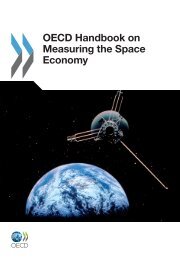Evaluating Country Programmes - OECD Online Bookshop
Evaluating Country Programmes - OECD Online Bookshop
Evaluating Country Programmes - OECD Online Bookshop
You also want an ePaper? Increase the reach of your titles
YUMPU automatically turns print PDFs into web optimized ePapers that Google loves.
<strong>OECD</strong> 1999<br />
<strong>Country</strong> Programme Evaluations Workshop: The Case of Tanzania<br />
failure to settle the political problem of Zanzibar might lead to major social upheavals<br />
on the islands and lead to a political crisis. Moreover, the large number of refugees<br />
(250 000) located at the borders with Rwanda and Burundi caused some unrest<br />
due to the pressure on local resources and interferences with Burundi.<br />
Finally, the big question remains: How long can Tanzania remain peaceful in a<br />
regional conflictual environment?<br />
Concluding remarks2 How can the effective involvement of partner country officials and beneficiaries<br />
be ensured given prevailing donor needs and requirements for accountability and<br />
professional evaluation standards?<br />
An overview<br />
The management of development process in a country is a partnership<br />
endeavour which should concern every party with a stake in it. In an ideal situation,<br />
the host government takes a lead in the process, its citizens/civil society are fully<br />
briefed on the underlying policies and strategies for country development enabling<br />
them to participate in the development process, and donor countries co-operate in<br />
support, based on local priorities. Hence, the programme design and intervention<br />
strategies should be based on expressed country/target groups’ needs and capacities.<br />
Feedback mechanisms, both top-down and bottom-up, should be included as<br />
well as indicators to address the impact of interventions. Subsequently, the country<br />
programme evaluation (CPE) purpose, criteria and standards should be integral to<br />
the programme design.<br />
Traditionally, and still tending to prevail today, country development issues<br />
were mainly a concern of the host government and donors, while the local population<br />
tended to be excluded from the setting of development priorities. Donors<br />
sometimes even took a lead in projects/programme design, planning, and also<br />
management of the process of implementation, so as to make sure that the standards<br />
and performance as perceived by them were attained. As a result of these<br />
misconceptions, the local know-how in the design and formulation of new programmes<br />
has been curtailed, hence perpetuating the donor-driven and unsustainable<br />
programme initiatives. The generally poor results and impact of such<br />
programmes to potential target groups are indicative of the approaches employed<br />
from their conception to the end result.<br />
Outlook<br />
To reverse this situation, it is imperative to learn first from past experiences<br />
and lessons so that a sound base can be established to anchor the new<br />
139

















![CQE=U]^\]Z: KAZAKHSTAN - OECD Online Bookshop](https://img.yumpu.com/3915768/1/190x253/cqeuz-kazakhstan-oecd-online-bookshop.jpg?quality=85)